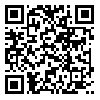Volume 15, Issue 2 (Summer 2020)
Salmand: Iranian Journal of Ageing 2020, 15(2): 212-223 |
Back to browse issues page
Download citation:
BibTeX | RIS | EndNote | Medlars | ProCite | Reference Manager | RefWorks
Send citation to:



BibTeX | RIS | EndNote | Medlars | ProCite | Reference Manager | RefWorks
Send citation to:
Ghezelseflo M, Mirza M. The Role of Self-compassion in Predicting Loneliness and Self-efficacy in the Elderly. Salmand: Iranian Journal of Ageing 2020; 15 (2) :212-223
URL: http://salmandj.uswr.ac.ir/article-1-1453-en.html
URL: http://salmandj.uswr.ac.ir/article-1-1453-en.html
1- Department of Psychology, Faculty of Humanities and Physical Education, Gonbad Kavous University, Gonbad Kavous, Iran. , me.ghezelseflo@gmail.com
2- Department of Psychology, Faculty of Humanities and Physical Education, Gonbad Kavous University, Gonbad Kavous, Iran.
2- Department of Psychology, Faculty of Humanities and Physical Education, Gonbad Kavous University, Gonbad Kavous, Iran.
Abstract: (8956 Views)
Objectives: Giving the growing population of the elderly, it is important to pay attention to their psychological health. The purpose of this study was to examine the role of self-compassion in predicting loneliness and self-efficacy in the elderly.
Methods & Materials: This is a descriptive correlational study. Study population consisted of all elderly residents of Gonbad Kavous County in Iran. Of these, 120 (70 women and 50 men) were selected using a convenience sampling technique. Data collection instruments were University of California, Los Angeles (UCLA) Loneliness Scale of Russell et al. (1966), General Self-efficacy Scale of Scherer et al. (1982) and Self-Compassion Scale of Neff (2003). Data analysis was performed by using Pearson correlation coefficient and multiple regression analysis.
Results: Loneliness had a significant negative relationship with self-compassion dimensions of self-kindness, common humanity, mindfulness and its overall score, and a significant positive relationship with self-judgment, isolation and over-identification. Moreover, self-efficacy had a significant positive relationship with self-kindness, common humanity, mindfulness and overall self-compassion score, and a negative significant relationship with self-judgment, isolation and over-identification (P≤0.001). Self-kindness, self-judgment, common humanity, isolation, mindfulness and overall self-compassion score can predict 43% of loneliness variance and self-kindness, self-judgment, mindfulness, isolation and overall self-compassion score can predict 38% of self-efficacy variance.
Conclusion: Self-compassion have an effective role in reducing loneliness and increasing self-efficacy in the elderly.
Methods & Materials: This is a descriptive correlational study. Study population consisted of all elderly residents of Gonbad Kavous County in Iran. Of these, 120 (70 women and 50 men) were selected using a convenience sampling technique. Data collection instruments were University of California, Los Angeles (UCLA) Loneliness Scale of Russell et al. (1966), General Self-efficacy Scale of Scherer et al. (1982) and Self-Compassion Scale of Neff (2003). Data analysis was performed by using Pearson correlation coefficient and multiple regression analysis.
Results: Loneliness had a significant negative relationship with self-compassion dimensions of self-kindness, common humanity, mindfulness and its overall score, and a significant positive relationship with self-judgment, isolation and over-identification. Moreover, self-efficacy had a significant positive relationship with self-kindness, common humanity, mindfulness and overall self-compassion score, and a negative significant relationship with self-judgment, isolation and over-identification (P≤0.001). Self-kindness, self-judgment, common humanity, isolation, mindfulness and overall self-compassion score can predict 43% of loneliness variance and self-kindness, self-judgment, mindfulness, isolation and overall self-compassion score can predict 38% of self-efficacy variance.
Conclusion: Self-compassion have an effective role in reducing loneliness and increasing self-efficacy in the elderly.
Type of Study: Research |
Subject:
Psychology
Received: 2017/12/13 | Accepted: 2018/07/09 | Published: 2020/07/01
Received: 2017/12/13 | Accepted: 2018/07/09 | Published: 2020/07/01
Send email to the article author
| Rights and permissions | |
 |
This work is licensed under a Creative Commons Attribution-NonCommercial 4.0 International License. |








